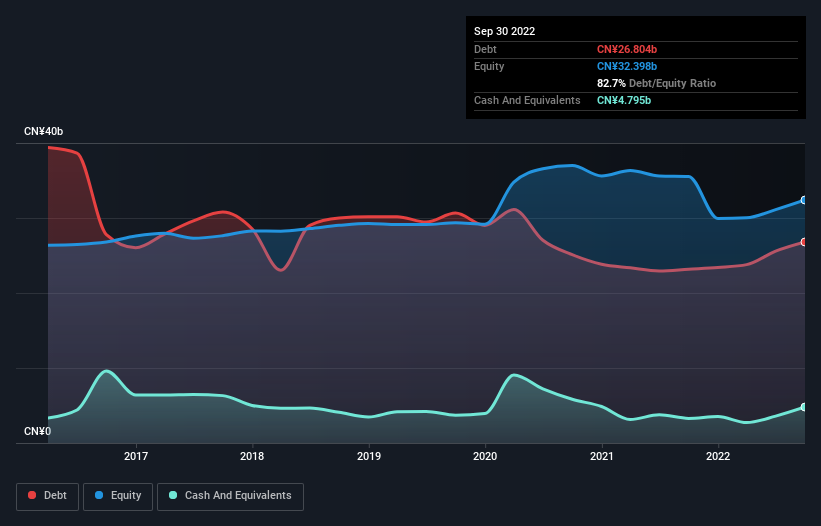- Hong Kong
- /
- Oil and Gas
- /
- SEHK:1138
We Think COSCO SHIPPING Energy Transportation (HKG:1138) Is Taking Some Risk With Its Debt

Warren Buffett famously said, 'Volatility is far from synonymous with risk.' So it might be obvious that you need to consider debt, when you think about how risky any given stock is, because too much debt can sink a company. Importantly, COSCO SHIPPING Energy Transportation Co., Ltd. (HKG:1138) does carry debt. But the more important question is: how much risk is that debt creating?
When Is Debt A Problem?
Debt is a tool to help businesses grow, but if a business is incapable of paying off its lenders, then it exists at their mercy. If things get really bad, the lenders can take control of the business. However, a more frequent (but still costly) occurrence is where a company must issue shares at bargain-basement prices, permanently diluting shareholders, just to shore up its balance sheet. Of course, debt can be an important tool in businesses, particularly capital heavy businesses. When we think about a company's use of debt, we first look at cash and debt together.
See our latest analysis for COSCO SHIPPING Energy Transportation
What Is COSCO SHIPPING Energy Transportation's Debt?
You can click the graphic below for the historical numbers, but it shows that as of September 2022 COSCO SHIPPING Energy Transportation had CN¥26.8b of debt, an increase on CN¥23.2b, over one year. However, it also had CN¥4.80b in cash, and so its net debt is CN¥22.0b.

How Healthy Is COSCO SHIPPING Energy Transportation's Balance Sheet?
We can see from the most recent balance sheet that COSCO SHIPPING Energy Transportation had liabilities of CN¥10.6b falling due within a year, and liabilities of CN¥23.3b due beyond that. Offsetting these obligations, it had cash of CN¥4.80b as well as receivables valued at CN¥2.84b due within 12 months. So its liabilities outweigh the sum of its cash and (near-term) receivables by CN¥26.3b.
COSCO SHIPPING Energy Transportation has a market capitalization of CN¥54.0b, so it could very likely raise cash to ameliorate its balance sheet, if the need arose. But it's clear that we should definitely closely examine whether it can manage its debt without dilution.
In order to size up a company's debt relative to its earnings, we calculate its net debt divided by its earnings before interest, tax, depreciation, and amortization (EBITDA) and its earnings before interest and tax (EBIT) divided by its interest expense (its interest cover). Thus we consider debt relative to earnings both with and without depreciation and amortization expenses.
Strangely COSCO SHIPPING Energy Transportation has a sky high EBITDA ratio of 7.4, implying high debt, but a strong interest coverage of 1k. This means that unless the company has access to very cheap debt, that interest expense will likely grow in the future. Shareholders should be aware that COSCO SHIPPING Energy Transportation's EBIT was down 54% last year. If that decline continues then paying off debt will be harder than selling foie gras at a vegan convention. The balance sheet is clearly the area to focus on when you are analysing debt. But it is future earnings, more than anything, that will determine COSCO SHIPPING Energy Transportation's ability to maintain a healthy balance sheet going forward. So if you want to see what the professionals think, you might find this free report on analyst profit forecasts to be interesting.
Finally, a business needs free cash flow to pay off debt; accounting profits just don't cut it. So the logical step is to look at the proportion of that EBIT that is matched by actual free cash flow. During the last three years, COSCO SHIPPING Energy Transportation produced sturdy free cash flow equating to 63% of its EBIT, about what we'd expect. This free cash flow puts the company in a good position to pay down debt, when appropriate.
Our View
Neither COSCO SHIPPING Energy Transportation's ability to grow its EBIT nor its net debt to EBITDA gave us confidence in its ability to take on more debt. But its interest cover tells a very different story, and suggests some resilience. When we consider all the factors discussed, it seems to us that COSCO SHIPPING Energy Transportation is taking some risks with its use of debt. So while that leverage does boost returns on equity, we wouldn't really want to see it increase from here. The balance sheet is clearly the area to focus on when you are analysing debt. But ultimately, every company can contain risks that exist outside of the balance sheet. For instance, we've identified 1 warning sign for COSCO SHIPPING Energy Transportation that you should be aware of.
If you're interested in investing in businesses that can grow profits without the burden of debt, then check out this free list of growing businesses that have net cash on the balance sheet.
New: AI Stock Screener & Alerts
Our new AI Stock Screener scans the market every day to uncover opportunities.
• Dividend Powerhouses (3%+ Yield)
• Undervalued Small Caps with Insider Buying
• High growth Tech and AI Companies
Or build your own from over 50 metrics.
Have feedback on this article? Concerned about the content? Get in touch with us directly. Alternatively, email editorial-team (at) simplywallst.com.
This article by Simply Wall St is general in nature. We provide commentary based on historical data and analyst forecasts only using an unbiased methodology and our articles are not intended to be financial advice. It does not constitute a recommendation to buy or sell any stock, and does not take account of your objectives, or your financial situation. We aim to bring you long-term focused analysis driven by fundamental data. Note that our analysis may not factor in the latest price-sensitive company announcements or qualitative material. Simply Wall St has no position in any stocks mentioned.
About SEHK:1138
COSCO SHIPPING Energy Transportation
An investment holding company, engages in the shipment of oil, liquefied natural gas (LNG), and chemicals along the coast of the People’s Republic of China and internationally.
Adequate balance sheet and fair value.


